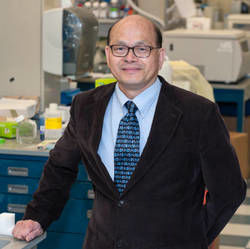Call Now Open
2026 Oxford-Harrington Rare Disease Scholar Award

Immunology, Oncology
Augmenting Universal Immunity to Combat Cancer
2019 Harrington Scholar-Innovator
In CAR T-cell therapy, a sample of a patient's T-cells (part of the immune system) are modified, then reinfused into the patient where they kill the tumor cells expressing the specific antigens.
However, properly modifying the T-cells requires accurate characterization of the specific antigens, a difficult and lengthy process. Further, even when the T-cells recognize the cancer cells, the response might not be strong enough to destroy the cancer. Dr. Wu and his team appear to have found a way to enhance the immune system so that cancer cells die regardless of the type of antigens expressed by the tumor.
Dendritic cells are cells whose main function is to process and present tumor antigens to the T cells, but the body only sends a small amount of dendritic cells to a tumor. "We've linked albumin, a protein in blood, to Flt3L, a protein that helps produce dendritic cells," Dr. Wu says. "The result is a molecule that tends to be delivered to the tumor location or lymph node, which in turn creates large amounts of dendritic cells, leading to many more T-cells capable of killing the cancer cells."
For some cancers, this breakthrough platform of immunotherapy would render irrelevant the need to know what types of antigen are present in the tumor, and could be used in concert with chemotherapy and PD-1 inhibitors (drugs that activate the immune system to attack some tumors).
“Harrington has been amazing - they are true experts at helping you move from the very preclinical discovery phase to clinical trial."
Source: Article from 2019-20 Annual Publication.